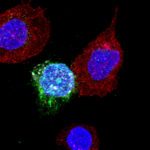Link to Pubmed [PMID] – 30629340
J Int AIDS Soc 2019 Jan;22(1):e25221
INTRODUCTION: HIV controllers (HIC) maintain viraemia at low levels without antiretroviral treatment and have small HIV reservoirs. Nevertheless, they are heterogeneous regarding their risk of infection progression. The study of reservoirs can help elucidate this control. This study aimed to explore the factors implicated in the pathogenesis of HIV infection that are potentially associated with HIV reservoirs and their dynamics in HIC.
METHODS: Individuals living with HIV included in the ANRS-CODEX cohort with at least two HIV-DNA measurements between 2009 and 2016 were selected. The total HIV-DNA levels had been quantified prospectively from blood samples. Mixed-effect linear models estimated the HIV-DNA dynamics over time.
RESULTS: The median (interquartile range (IQR)) HIV-DNA level was 1.5 (1.3 to 1.9) log copies/million peripheral blood mononuclear cells at inclusion (n = 202 individuals). These low levels showed heterogeneity among HIC. Lower levels were then associated with the protective HLA-B*27/B*57 alleles and/or lower HIV-RNA level at inclusion, negative hepatitis C virus serology, lower HIV-suppressive capacity of specific CD8 T cells and lower levels of immune activation and inflammation. Interestingly, mathematical modelling of the dynamics of HIV-DNA over time (840 measurements) showed that the number of infected cells decreased in 46% of HIC (follow-up: 47.6 months) and increased in 54% of HIC. A multivariate analysis indicated that HLA-B*27/B*57 alleles, a low level of HIV-RNA and a low level of HIV-DNA at inclusion were markers independently associated with this decrease.
CONCLUSIONS: These results offer new insights into the mechanisms of long-term control in HIC. In half of HIC, the decrease in HIV-DNA level could be linked to tighter viral control and progressive loss of infected cells. These findings allow the identification of HIC with a low risk of progression who may not need treatment.




